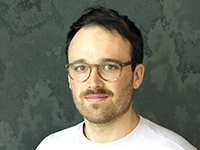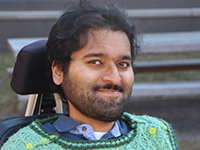The National Science Foundation (NSF) has awarded prestigious Graduate Research Fellowships to several current MCO students and alumni of the Neuroscience, MCB, and CPB concentrations. The NSF Graduate Research Fellowship Program (GRFP) was established in 1951, as one of the agency’s very first efforts to support graduate studies in science. NSF Graduate Research Fellows receive a three-year stipend and a cost of education allowance paid to the institution where they study.
Among this year’s GRFP recipients are three alumni of our department—Theodora Mautz (Neuro ‘19), Abigail Joseph (MCB’ 22), and Marissa Sumathipala (Neuro ‘22)—and two soon-to-be graduates, Pallas Chou (CPB ‘23), and Caleb Shi (CPB ‘23).
GRFP awards also went to MCO graduate students Katelyn Comeau (G2),and Joshua Corbo (G1), as well as Systems, Synthetic, and Quantitative (SSQ) Biology graduate student Rishabh Kapoor and Biophysics graduate student Luis Aldama, who are both conducting their thesis research in MCB Labs. OEB graduate student Maya Woolfolk was also named as a GRFP awardee in 2022.
Read on to learn more about these outstanding graduate students.

Luis Aldama (G2, Hekstra Lab)
Biophysics graduate student Luis Aldama says he’s “very honored and grateful” to be among this year’s GRFP recipients. “Prior to joining the Harvard Biophysics Graduate Program, my research experience was primarily in the wet lab,” he says. “However, I made the decision to pursue a computational project for my PhD thesis, and my NSF GRFP proposal reflected that choice. Receiving this fellowship is important to me, as it validates my decision to tackle a new field.”
As an undergraduate, Aldama worked on protein crystallography in Emina Stojkovic’s lab at Northeastern Illinois University. He purified protein crystals and collected data on them using synchrotrons. “I became fascinated with crystallography because it filled my curiosity to understand and visualize the molecular world,” he says. “At Harvard, my interests shifted towards the mathematics underlying crystallography, and I particularly wanted to know why crystallography works.”
To pursue this curiosity, Aldama joined the Hekstra Lab at Harvard. “My rotation in the Hekstra Lab allowed me to delve deeper into the mathematical theory of crystallography, and I also learned about computational crystallography projects that incorporated machine learning methods to process crystallographic data,” he says. Aldama’s project is to train machine learning algorithms on X-ray crystallography data from the Protein Data Bank.
In X-ray crystallography, an X-ray beam hits the protein’s electrons, causing diffraction in very specific directions. Detecting this diffraction enables scientists to understand the protein’s structure. Aldama will build a model using machine learning to elucidate the relationship between X-ray diffraction and protein structure. “I am very excited about this project because, if successful, it will enable us to push the limits of the structural information that we can learn from crystallographic data,” he says.
Aldama expressed gratitude toward several colleagues and supporters who have helped him transition from wet lab research to computational biophysics. These include his mentors, Doeke Hekstra and postdoc Kevin Dalton, as well as Emina Stojkovic and MCB faculty Rachelle Gaudet, who wrote letters for Aldama’s GRFP application. “Lastly, I would like to thank my parents and my girlfriend for their constant support and encouragement,” Aldama says. “I couldn’t have come this far without them.”

Katelyn Comeau (G2, Goodrich Lab at HMS)
Second-year MCO graduate student Katelyn Comeau is conducting her thesis research across the river in Lisa Goodrich’s lab at HMS. Comeau’s goal is to explore the field of auditory neuroscience and identify a novel circuit in auditory processing.
The GRFP will support Comeau’s work going forward. “I feel so grateful and honored to receive this fellowship in support of my thesis work,” Comeau says. “I applied for the first time in 2021 and received honorable mention for the award, but I was able to use the feedback I received from the reviewers to improve my application this time around.”
Choosing a research project was not a simple process for Comeau. “When I was applying for graduate programs, and even when I was rotating in labs throughout my G1 year, I actually wasn’t sure if I wanted to continue studying neuroscience,” she says. “My only prior intensive research experience was in the lab of Dr. David Ginty in the Department of Neurobiology at HMS as a Research Assistant. There, I worked closely with my postdoc mentor Dr. Shan Meltzer on projects uncovering molecular mechanisms of somatosensory neuron development. I became very interested in sensory biology during that time, and it was a very natural transition to the goals and research in the Goodrich Lab.”
She adds that she is looking forward to conducting her research and grateful for the support she has received from friends and mentors. “My favorite part about crafting my application for the GRFP was reflecting on my journey to graduate school as a first generation student,” Comeau says. “I have many people to thank that have helped me along the way — without them, I would not get to be doing such cool science here, or have the support of the GRFP fellowship. In particular, I am immensely thankful for continued guidance and support from my advisor and mentor Dr. Lisa Goodrich, and from my amazing lab mates. I also want to thank Dr. David Ginty, who introduced me to the field of neuroscience and provided lots of guidance throughout my past-bacc and grad student stages.”

Joshua Corbo (G1)
First-year MCO graduate student Joshua Corbo is currently completing his rotations before selecting a lab for his thesis research. “I came to grad school motivated to do ‘cool science,’” he says. “I knew I wanted to challenge myself by switching fields and pursuing new questions…The first year of grad school provided the opportunity to rotate in a variety of labs and explore new topics, techniques, and questions.”
“Because the MCO program is interdisciplinary, it acts as an incubator for scientists of different backgrounds to come together to tackle novel and unexplored questions in biology,” Corbo adds. “My first rotation was in the Bellono Lab which studies sensory biology at the molecular, cellular, and organismal levels–i.e., cool science. My rotation project in the Bellono Lab became the basis of my NSF proposal and focused on RNA editing in cephalopods. In my first year, I navigated fields from sensory biology to chromatin remodeling and epigenetics to single-cell transcriptomics method development (and maybe one more).”
Corbo adds that he is glad to be chosen as an NSF Graduate Research Fellow. “Although I am still rotating, I am honored to receive the NSF GRFP because it will allow me to chase my scientific curiosities,” he says. “The award grants me scientific freedom and support as I continue through my PhD. I would like to thank Dr. Nick Bellono for helping me craft a proposal and grateful to Dr. Ethan Garner and Dr. Catherine Dulac for providing feedback on the many drafts I sent them.”

Rishabh Kapoor (G2, Extavour Lab)
SSQ Biology Graduate Student Rishabh Kapoor is investigating the molecular evolution of microbes that live on arthropods. “I’ve become fascinated by genes that cross this host-microbe divide through horizontal gene transfer (HGT) and how they can drive novel, adaptive phenotypes. I’m currently developing bioinformatic methods to detect ‘chimeric’ genes that are the products of HGT from microbes to animals, followed by fusion with pre-existing animal genes.”
Kapoor’s initial efforts have identified unexpected combinations of prokaryotic and eukaryotic genes in arthropods. “For instance, what’s a bacterial transcription termination factor domain doing in the same open reading frame as an arthropod DNA polymerase?” he says. “I’m excited to experimentally and bioinformatically probe the evolutionary history and molecular functions of these unusual genes.”
He adds that he’s grateful to receive public funding in support of his research. “Even as the applied life sciences revolutionize fields like medicine and agriculture, I believe it is essential that we also continue to cultivate curiosity-driven science,” he says.
The Extavour Lab has proved to be a dynamic and positive environment for Kapoor’s research thus far. “One way of describing the Extavour lab is a one-of-a-kind community of evolutionary biologists, microbial ecologists, biophysicists, bioinformaticians, and developmental biologists,” Kapoor says. “Another perspective is that we are a community of scientists who view such labels as largely unnecessary. Our discussions freely move between minute-to-minute cellular dynamics during embryonic development to the histories of gene families over hundreds of millions of years. My own project also reflects this interdisciplinary spirit.”
In addition to his computational work, Kapoor is excited to collaborate with wet lab experimentalists and contribute to outreach efforts. “I look forward to continuing my outreach activities to encourage high school students to cultivate their own scientific curiosity. I am especially mindful of my potential to serve as a role model for students with physical disabilities, who may question, as I once did, whether there is a place for them in the life sciences.”

Maya Woolfolk (G3, Hoekstra Lab)
OEB graduate student Maya Woolfolk of the Hoekstra Lab is studying the sounds baby deer mice (in the genus Peromyscus) make and how they differ between species. “I am interested in understanding what mechanisms facilitate the evolution of this innate behavior,” she explains. “This fellowship will help support many projects to address my research question, including genetic mapping crosses, behavioral experiments, and anatomical studies.”
Woolfolk aims to leverage the Hoekstra Lab’s interdisciplinary nature to pursue her questions about deer mice vocalizations. “Since my time as an undergraduate I have had an interest in evolutionary biology and genetics,” she says. “The Hoekstra Lab is exceptionally interdisciplinary, harboring expertise in genomics, neuroscience, and behavior–all areas essential to the success of my proposed research—making this lab a great fit for me and my interests.”
As a member of “Team Squeak” and a recipient of the Gilliam Fellowship, Woolfolk is excited to continue her thesis research and working toward a career in academia. “I feel truly honored to have received the NSF GRFP,” she says. “It feels particularly special because the GRFP aims to award the potential of recipients—the potential to become experts in our fields, to be successful in our future careers, and to contribute to the scientific enterprise in a meaningful way.”
“I would like to thank everyone who helped me throughout the application process,” Woolfolk adds. “This includes the people who wrote recommendation letters, the people who read my personal and research statements to give constructive feedback, and everyone else who supported me.”
Congratulations to these graduate students!


